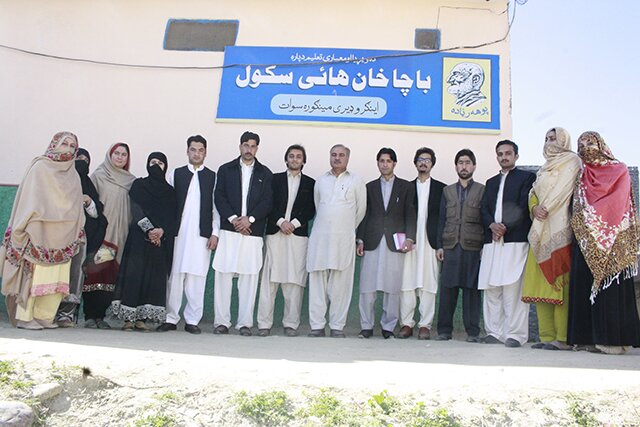BKTEF Fellows Set up Khudai Khidmatgaari Camp at BKS Mingora Swat
BKTEF Fellows Set up Khudai Khidmatgaari Camp at Baacha Khan School Mingora Swat
For connecting with people at the grass roots level in continuation of Khudai Khidmatgaar Movement (KK Movement) initiated by Khan Abdul Ghaffar Khan aka Baacha Khan, the Fellows of Baacha Khan Trust Educational Foundation (BKTEF) set up a Khudai Khidmatgaari Camp from Feb 21 till Feb 24 2016 at Baacha Khan Schools Swat. The Khudai Khidmatagaari camp aimed at listening to the common people, presenting to them alternative in the shape of the KK narrative and engaging in dialogue with the common people for socio-cultural transformation, economic independence and political empowerment. The BKTEF Fellows had earlier done extensive exercises for categorizing constituent parts of the KK narrative. Adopting non-violence and dialogue for conflict resolution, increasing space for democratic values, advocating gender equity and reclaiming pluralist cultural norms had been categorized to be the priority areas of the Khudai Khidmatgaari Camp.
The fellows of the BKTEF have been trained in political thought, Pashtun progressive nationalist narrative and history of Khudai Khidmatgaar movement with wide ranging readings over the past one year. Before setting out for the Camp, the Fellows held a detailed meeting for formulating principles and distribution of responsibilities. They formulated the following principles:
1- They would cook and make arrangements for themselves. No support for food, service and stay would be accepted from friends and relatives of the area.
2- They would be trying to help people in cleaning the streets and homes and help in other immediate chores.
3- They would be listening to the people with empathy and would put down sufferings and difficulties the people were passing through.
4- They would avoid debate on religion and local partisan polemics.
5- They would be focusing on the common people in farms, markets, hujras and streets.
6- They would walk instead of using automobiles as much as possible.
7- They would engage in discussions with people on the following issues:
a- Discussion on the questions of what, how and why of the present situation of society.
b- Elaborating narrative and history of Baacha Khan and KK Movement.
c- Reading from and distribution of Zama Jwand ao Jeddujuhd and other pamphlets from Bacha Khan Ao Khudai Khidmatgaari.
Nine men Fellows and seven women Fellows set out for Mingora Swat in the afternoon of February 21 2016 and reached there in the late evening.
Within almost three days, they met 350 to 400 people from cross section of society in Mingora Town, subarban villages of Engaro Dherai, Mam Dherai, Kuza Bandai and Bara Bandai. They would make groups for different locations to meet people in Bazars, farms, hujras and streets. The women fellows would visit homes in various streets of Mingora Town. (They called this Jarga Maraka). They would try to clean streets, help in reconciliation when came across some kind of conflict, help in urgent chores and engage with people in discussions.
In the evening, they would share their observations (which they called Nanai Haley Zaley). Then they would reflect on their observations collectively and derive conclusions (this they called Tafakkur). After Haley Zaley and Tafakkur, they would read something from a book and would discuss the contents. Then they would plan for the next day, distribute responsibilities and go to bed. Various fellows had taken responsibilities for documentation, financial management, logistics, security, cooking and washing of dishes alternately.
Tentative conclusions:
1- The Fellows found common people were more than eager for dialogue (Jarga&Maraka). The people would be initially skeptic but would open up just after a few moments. Almost all the people they met had very positive attitude towards Baacha Khan and Khudai Khidmatgaari.
2- The Fellows also found common people in farms, markets, hujras and women in homes raising very critical questions on the policies of the state regarding terrorism and economy.
3- They observed that extremist narrative had deeply permeated into socio-cultural fabric.
4- The Fellows observed widening class and gender gaps in different localities.









